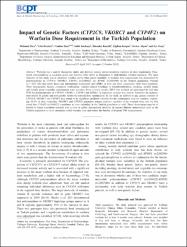| dc.contributor.author | Özer, Mahmut | |
| dc.contributor.author | Demirci, Yeliz | |
| dc.contributor.author | Hızel, Candan | |
| dc.contributor.author | Sarıkaya, Sabit | |
| dc.contributor.author | Karalti, Iskender | |
| dc.contributor.author | Kaspar, Çiğdem | |
| dc.contributor.author | Genç, Ece | |
| dc.date.accessioned | 2019-10-19T16:02:58Z | |
| dc.date.available | 2019-10-19T16:02:58Z | |
| dc.date.issued | 2013 | |
| dc.identifier.issn | 1742-7835 | |
| dc.identifier.uri | https://dx.doi.org/10.1111/bcpt.12024 | |
| dc.identifier.uri | https://hdl.handle.net/11421/13994 | |
| dc.description | WOS: 000314915200011 | en_US |
| dc.description | PubMed ID: 23061746 | en_US |
| dc.description.abstract | Warfarin has a narrow therapeutic index and displays marked person-to-person variation in dose requirement. Functional polymorphisms at candidate genes can therefore offer utility as biomarkers to individualize warfarin treatment. The main objective of this study was to determine whether and to what extent variability in warfarin dose requirements was determined by polymorphisms in CYP2C9, VKORC1, CYP4F2 (rs2108622) and EPHX1 (rs2292566) in the Turkish population. Patients (n=107) who had stable doses and international normalized ratio (INRs) at their last three consecutive visits were registered. Their demographic factors, concurrent medications, warfarin-related bleedings or thromboembolisms, smoking, alcohol intake and weekly green vegetable consumption were recorded. From a blood sample, DNA was isolated and genotyped by real-time PCR for polymorphisms of CYP2C9, VKORC1, CYP4F2 and EPHX1. A regression analysis was used to determine the independent effects of genetic and non-genetic factors on warfarin dose optimization. In our study, in addition to age, genetic variants of CYP2C9, VKORC1 and CYP4F2 were found to be significant predictor variables for the maintenance dose for warfarin, explaining 39.3% of dose variability. VKORC1 and CYP2C9 genotypes remain predictor variables of the warfarin dose, and we first found that CYP4F2 (rs2108622) contributes to dose variability in the Turkish population as well. These observations may be of benefit to future translation research with a view to global personalized medicine in regions hitherto understudied such as the Turkish population so as to rationalize initial warfarin dose and reduce the burden of frequent INR measurements. | en_US |
| dc.description.sponsorship | Yeditepe University [201008003] | en_US |
| dc.description.sponsorship | The authors thank the anonymous reviewers for their insightful comments and suggestions, which greatly improved the manuscript. We are indebted to all patients who accepted participation in the study and acknowledge Yeditepe University (project number 201008003) for funding this study. We also would like to thank to Dr. Veronique Michaud for kindly and generously providing samples. | en_US |
| dc.language.iso | eng | en_US |
| dc.publisher | Wiley-Blackwell | en_US |
| dc.relation.isversionof | 10.1111/bcpt.12024 | en_US |
| dc.rights | info:eu-repo/semantics/openAccess | en_US |
| dc.title | Impact of Genetic Factors (CYP2C9, VKORC1 and CYP4F2) on Warfarin Dose Requirement in the Turkish Population | en_US |
| dc.type | article | en_US |
| dc.relation.journal | Basic & Clinical Pharmacology & Toxicology | en_US |
| dc.contributor.department | Anadolu Üniversitesi, Edebiyat Fakültesi | en_US |
| dc.identifier.volume | 112 | en_US |
| dc.identifier.issue | 3 | en_US |
| dc.identifier.startpage | 209 | en_US |
| dc.identifier.endpage | 214 | en_US |
| dc.relation.publicationcategory | Makale - Uluslararası Hakemli Dergi - Kurum Öğretim Elemanı | en_US] |


















